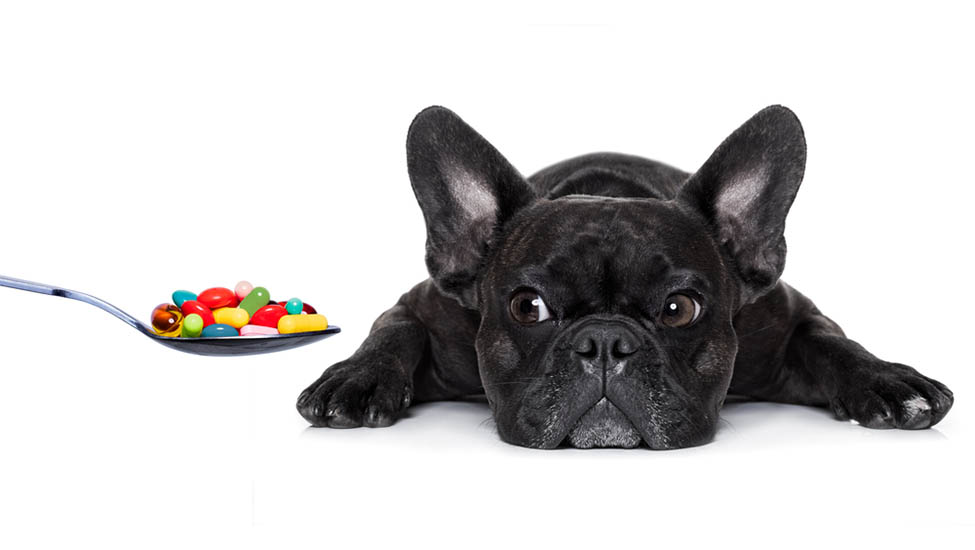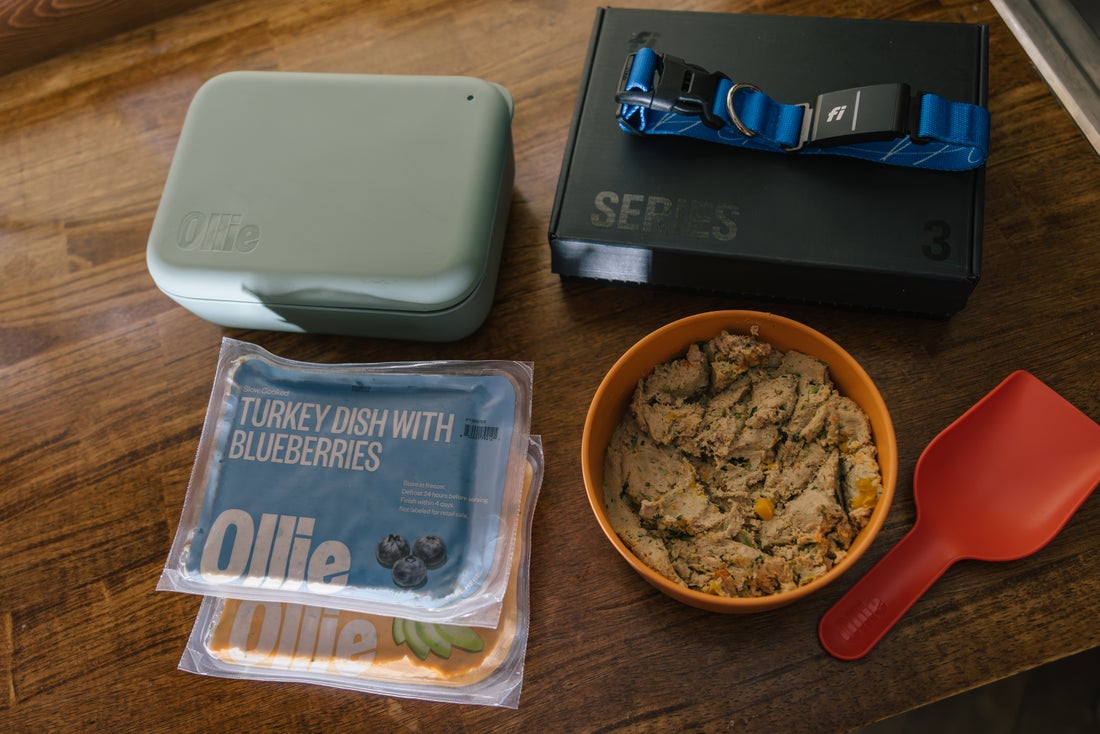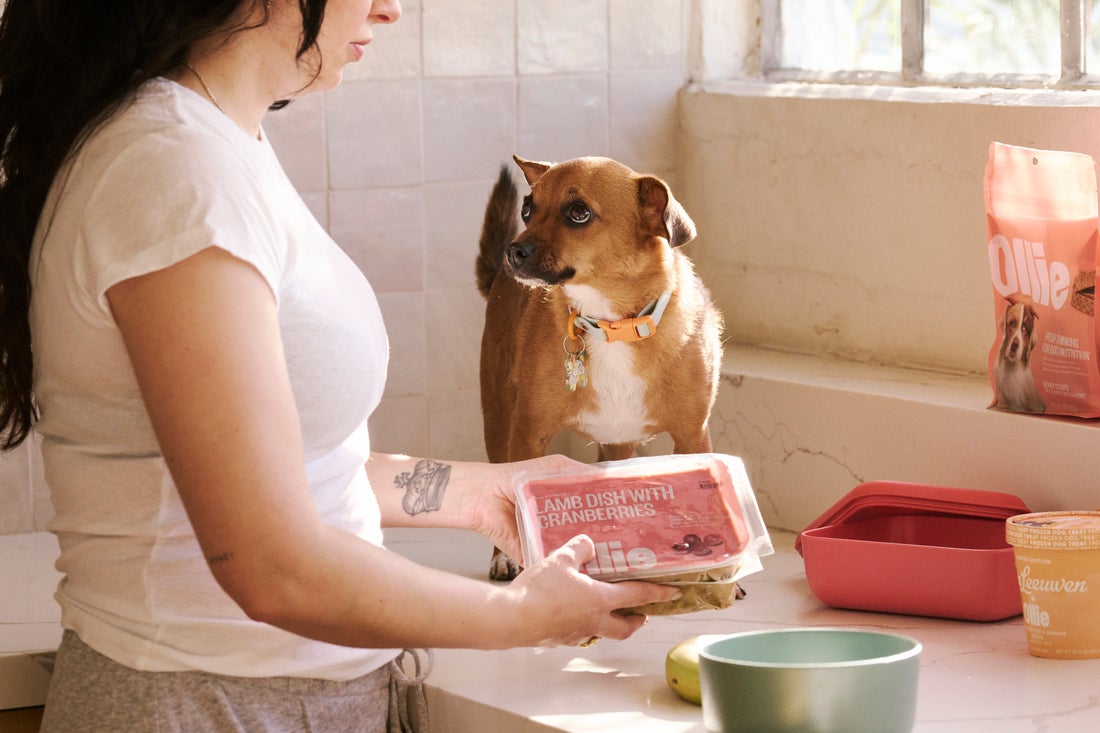Hey Ollie blog readers! We’re offering you an exclusive 60% OFF your starter box! Try now!
You pop a multivitamin every morning—so should your pup be doing the same? It might seem logical, since dogs benefit from eating a diet that’s similar to humans’ in quality of ingredients. “Many of the vitamins important to our bodies play the same roles in metabolism and structural functioning in our pets,” says Korinn Saker, DVM, Ph.D., an associate professor of clinical nutrition at North Carolina State University. But while they need certain vitamins, they don’t necessarily need to take one. Find out which are most crucial for your canine and ensure he’s always getting the right amount of all of them.
Which vitamins are essential for pups
There are two main classes of vitamins—water-soluble (like B and C) and fat soluble (A, D, E, and K)—and just like you, your dog benefits from both. “Water-soluble vitamins are associated with metabolism and making sure dogs can use nutrients for energy, while fat-soluble vitamins are for structural and functional things, like bone formation, cell membrane functioning, vision,” says Saker.
Water-soluble B vitamins (including biotin and folic acid) help with energy production and intermediary metabolism. Unlike humans, dogs don’t really need vitamin C; a pathway in their bodies produces it for them. Vitamin A helps maintain your dog’s vision; beta carotene is important for supporting the GI tract. Vitamin D helps a dog’s body regulate calcium, build strong bones, and maintain a healthy immune system; and Vitamin E serves as an antioxidant, while K supports blood-clotting proteins.
Where pups get the vitamins they need
If your dog is healthy and you’re giving him a diet of commercial food that’s labeled “Complete and Balanced,” he’s likely fine without any extra vitamins by way of supplements. Whipping up meals for your pup at home? It’s harder than you might think. Pay attention to fruits and veggies that are good sources of the vitamins he needs—like sweet potatoes for vitamin A and beets for folate. That being said, even if your at-home recipes are packed with fresh produce, they likely don’t have the concentrated doses of vitamins that your dog needs, says Saker. In those instances, a vitamin supplement is necessary and you should consult your vet for the appropriate dosage based on the rest of your dog’s diet.
Why supplements are smart for some dogs
Your pup might have an underlying health condition or one that develops as he gets older that necessitates getting more of a certain vitamin. Dogs with dermatosis can benefit from extra zinc, for instance, and those with hip dysplasia might need a supplement formulated for joint support. Dogs that are super-active—ones that go on long runs, pull a sled, or run around on hunting trips, for example—can also benefit from additional antioxidants, says Saker. She advises that owners who have dogs that fall into this category look into a vitamin E supplement to support their pup’s physiological structure and active performance.
When there’s too much of a good thing
Of course, just because vitamins are generally beneficial for your dog’s overall well-being doesn’t mean you can’t go overboard. Not all dogs need a supplement, and adding one to your dog’s diet with no basis might do more harm than good, says Saker. “An example would be a dog that is given vitamin D supplementation just because the owner wanted, which could lead to vitamin D toxicity, hyper-calcemia, or anorexia,” she explains. Likewise, too much vitamin A can cause joint pain. Bottom line: Your vet knows what’s best when it comes for vitamins for your pup, so talk to them before adding any supplements to the menu.
The Ollie blog is devoted to helping pet parents lead healthier lives with their pups. If you want to learn more about our fresh, human-grade food, check out MyOllie.com.
Tagged As:

The nutrition your dog needs,
the food they want.

Enjoying our articles? Subscribe our Newsletters and get new articles directly to your inbox
You might also like
18 September 2025
5 MINS READ
Can I Rotate Fresh Dog Food Flavors?
Yes, it’s safe to rotate fresh dog food flavors, and many dogs actually benefit from the variety. At Ollie, we offer multiple fresh recipes, like Beef, Chicken, Turkey, Lamb, and Pork so you can…
by Ollie Pets
18 September 2025
5 MINS READ
Is Fresh Dog Food Safe During Power Outages?
Fresh dog food is only safe during a power outage if it has stayed cold, specifically, below 40°F. Once the temperature rises above that point, bacteria can start to grow, and the food may no lon…
by Ollie Pets
18 September 2025
5 MINS READ
How Do I Store Fresh Dog Food While Traveling?
If you’re bringing fresh dog food on the road, keeping it cold is key. The best way to store it is in a cooler with ice packs or a travel freezer. At Ollie, our vacuum-sealed fresh food stays good…
by Ollie Pets







